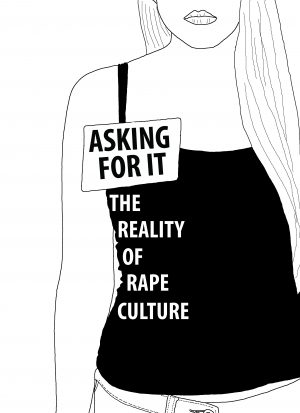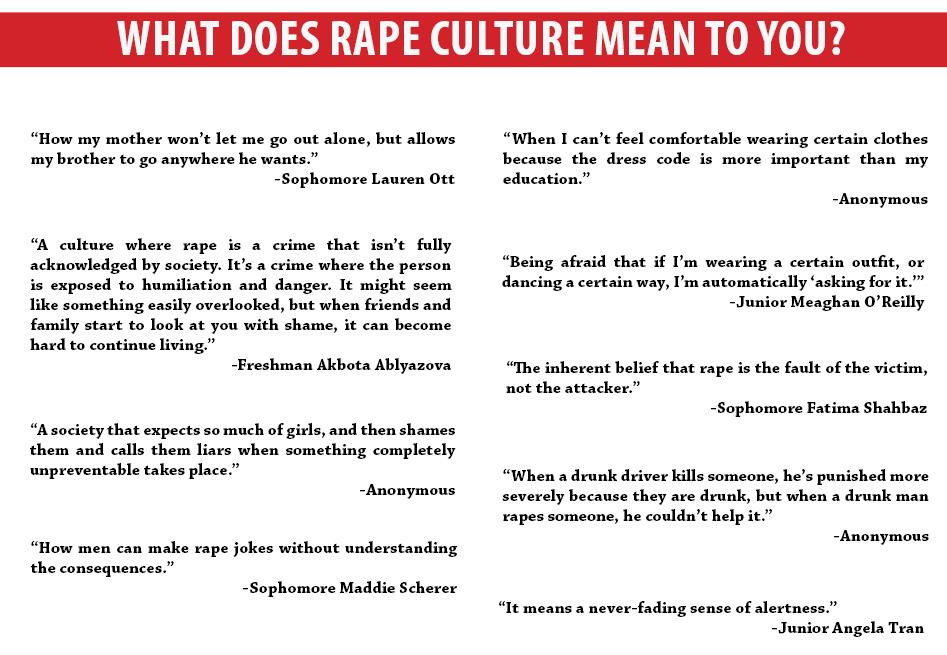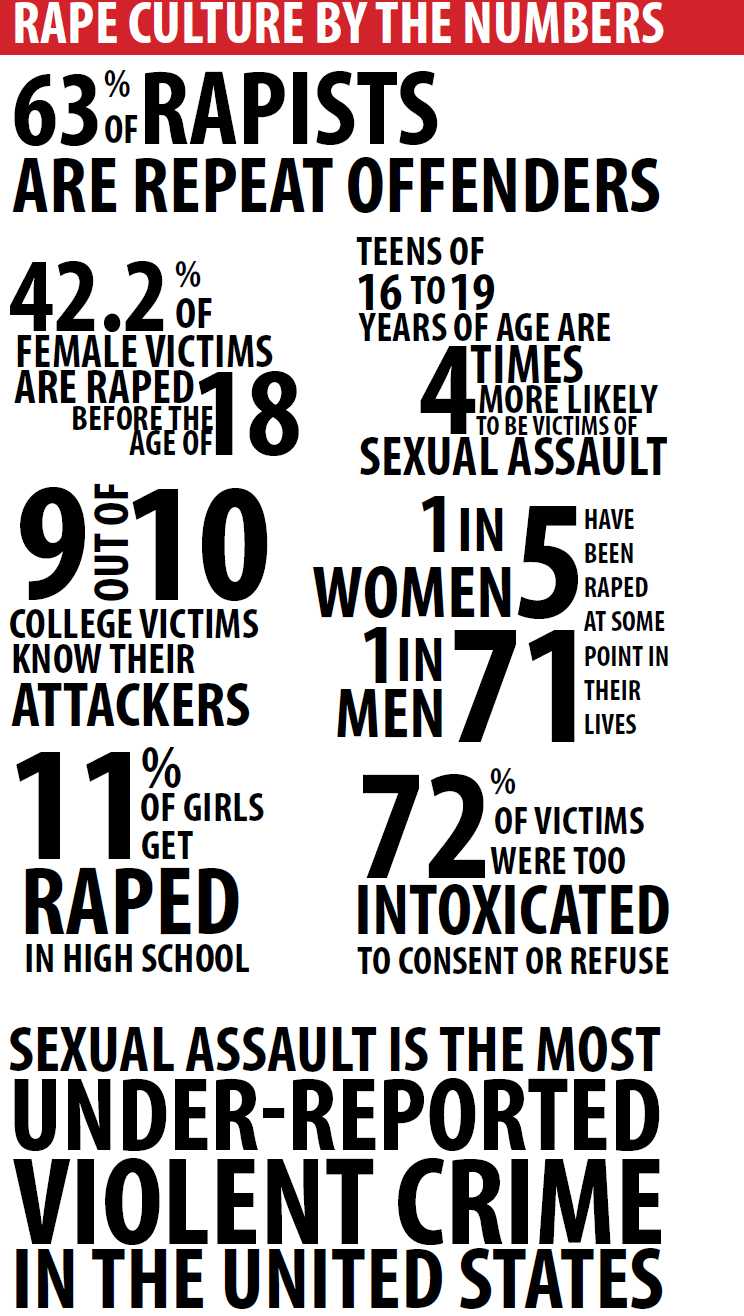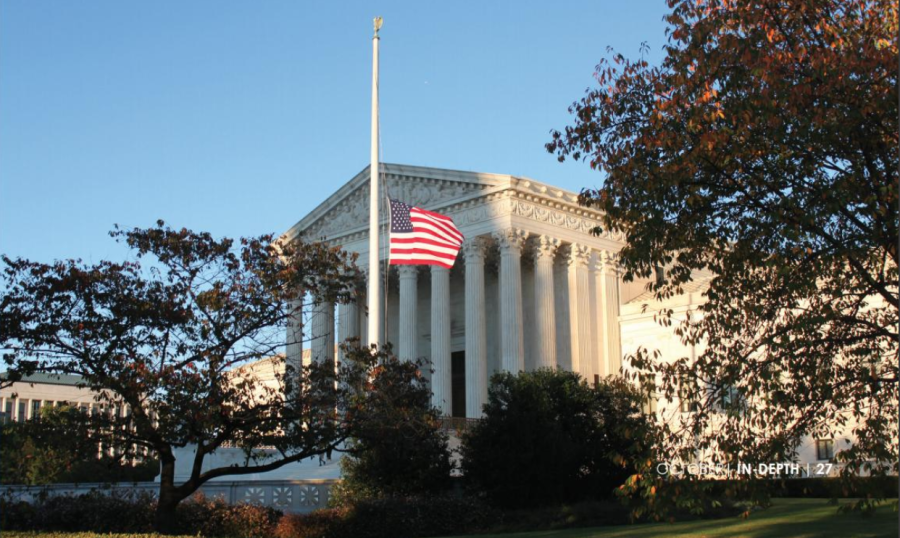
She remembered a boy taking her into a bedroom. She remembered him putting her into her clothes after she vomited, but she didn’t remember the time in between. Amy went through the next week confused and worried about what happened in that room until she gathered the courage to text him and ask him.
He nonchalantly informed her that they had sex, and Amy felt a pit in her stomach. She was violated, and she didn’t even have any recollection of it. The boy brushed the encounter off without a thought, and laughingly told her it was “fairly mutual.” Her friends all doubted her claims, and they whispered about how she definitely just regretted having sex with him whenever she stepped out of earshot.
Amy is a student at McLean. Her story is no joke or exaggeration. Not only is Amy a victim of rape, she is also a victim of rape culture.
WHAT IS RAPE CULTURE?
Rape culture is prevalent in a society that perceives sexual assault as normal due to gender-biased attitudes and stereotypes. It includes victim-blaming, meaning the victim is held either completely or partially responsible because of what they were wearing or if they were intoxicated. It encompasses a society that allows sexual objectification, rape jokes and trivializing circumstances.
What is rape culture? It is being mocked for trying to bring attention to the normalization of rape in television shows, movies and social media. It’s accusing the victim of ruining someone’s life, even though they did the right thing by reporting a crime.
Rape culture is Yale fraternities making their pledges chant “no means yes” repeatedly while being hazed. It’s a Texas Tech fraternity distributing an email titled “Luring your rape bait.” It’s the act of hanging up a “Top 10 ways to get away with rape” poster at the Miami University of Ohio.
According to the US Department of Justice, teens 16 to 19 years of age are four times more likely than the general population to be victims of sexual assault. This proves it is a pressing issue that is specifically affecting high school and university students.
Although rape is committed by women as well as men, statistics from the charity One In Four, which provides support and resources to people who have experienced sexual abuse and sexual violence, show that in 93 percent of cases of men who are raped, a man is the perpetrator.
Marc Lamont Hill, a CNN political commentator, argues that jokes involving some form of sexual assault or rape contribute to “cultural logic that minimizes the immorality, illegality and trauma of rape.”
Many are not even aware that the things they are doing and saying are wrong when they take part in rape culture. A teenager who believes rape is bad may make a rape joke and not even realize they are supporting the very act they claim to reject. That “harmless” rape joke is making light of a horribly traumatizing crime and trivializing its seriousness.
“I think [rape culture] is something that goes unseen and [is] not talked about, but I think it’s pervasive, and people can enable it and propagate it without intending to,” junior Jack Posey said.
Lack of education on rape across America gives people an unrealistic idea of what rape actually is to the extent that people can’t even comprehend that what they are joking about is in fact rape and not just someone’s drunken mistake.
“I was never educated about rape or sexual violence in school, and I think this needs to change,” said 2014 McLean graduate Maggie Lam, who was raped at a party while in high school. “People need to be aware that rape culture exists even in high school.”
Crime shows like NCIS, CSI and Law and Order: SVU bolster an incorrect idea of rape in the minds of the public. The media paints an unrealistic picture of crime that often keeps people who have been raped from reporting it. They are unable to see their attack as a “real” rape because it was not like the rape they see on television.
“This easy accessibility can make sexual assault more normal, and it’s not,” school psychologist Beth Werfel said.
Nine out of 10 college victims know their attackers, according to the US Department of Justice. Rapists are not just random, criminally insane strangers—they are trusted friends, family members and even lovers.
Imagine a person reporting that their car had been broken into to the police, and having the police respond by shrugging it off, saying that if they drive that kind of car, they should expect to have things taken from them. This is victim-blaming: holding a victim responsible for a crime they could not prevent.
Victim-blaming often keeps rape victims from reporting the crime. It is hard for someone to come forward when they know their character, choices and story will be thoroughly questioned. Keeping the attack to themselves may seem like the easier choice for many.
“Taking action is how we will be able to combat the entire rape culture,” Lam said.
Lam realizes how difficult it may be to report rape, but reporting a rapist may prevent them from committing the same crime again. It also teaches people that rape is not a trivial crime.
HOW DOES RAPE CULTURE AFFECT MCLEAN STUDENTS?
Where there is a party culture, a rape culture can almost always be found. In the Harvard School of Public Health College Alcohol Study, nearly three-quarters of rape victims reported that their rapes happened when they were too intoxicated to consent or refuse. Party and rape culture have a symbiotic relationship, fueling off one another and perpetuating the crimes they often mutually breed. Because of this, it also means a rape culture exists in almost every college and high school in the country, including McLean.
When asked if there is a rape culture at McLean, Principal Ellen Reilly replied, “Not that I know of—I mean, I haven’t had to deal with any reports.”
Additionally, Werfel stated she was unaware of rape at McLean, concluding that, “Girls are hesitant to come forward and ask for support.”
Administrators at McLean have this lack of knowledge of the existing off-campus rape culture because so few students come forward with their experiences or information regarding others’ experiences. Although the school recently offered an informative assembly for female students to learn about physical defense, more must be done to prevent future rapes.
“What we’re trying to do right now is [focus on students’] wellness and mindset [and instill] positive culture instead of finding the negatives that you can easily find on any campus across America,” Reilly said. “Finding that inner strength in you to surround yourself with positive people and not getting into that bad culture…is helpful.”
The ideas that college rapists use to justify their actions form and grow in high school. Rape is often trivialized and joked about by high school students. This nonchalant view of sexual crimes puts rapists in the mindset that rape is not that big of a deal.
“Rape is a crime, and that’s not a laughing matter. No means no—that doesn’t mean push harder. If you have been a victim and you haven’t made a report, what happens to [the rapist]? Criminals keep committing a crime,” School Resource Officer Scott Davis said. “We can help you. We have a lot of resources to connect you with the process of getting through it. I hope students come to me.”
While Reilly and Davis made it clear that victims who come forward will be provided with support, it is important for the McLean High School community to educate students about sexual assault even though these crimes do not usually take place on campus.
“Sexual violence doesn’t only happen in college parties or in the ‘adult world.’ It’s a much bigger problem that is prevalent in every part of our society,” Lam said.
When Lam was a senior at McLean, she was raped at a friend’s birthday party. Alcohol played a major role. Her attacker was someone she knew, and he took advantage of her when she was in a state of intoxication. Her experience is not by any means an uncommon one among high school girls.
Teenagers often begin to explore the world of drinking in high school, and due to lack of education they aren’t fully aware of what actually constitutes rape. Students are not educated on how to drink responsibly but engage in partying regardless. They can find themselves being taking advantage of by a peer, and bystanders may not even understand the severity of the situation.
Amy’s rape, discussed earlier in this article, is yet another example of a rape occurring in high school in a situation with underage drinking to an excess.
“People totally assume that if you were under the influence at the time of the rape that you just regret your decision to have sex,” Amy said.
Amy is one of the many people who have fallen victim to rape at a house party and have not come forward with their story because of the state they were in at the time of the rape.
“We can’t expect our boys to know what’s appropriate or not when they haven’t been taught,” said Joy Beskin, editorial director of Macmillan Children’s Publishing Group, who published Laurie Halse Anderson’s novel Speak, which tells the story of a young high schooler who has been raped. “We teach kids right from the start, you don’t hit, that’s not how you express yourself, but often these conversations don’t extend to sex and sexuality.”
Many people don’t realize that just because someone wasn’t held down kicking and screaming and physically forced into it, it wasn’t rape. If someone is unable to consent it is considered a sexual crime.
According to the Youth Risk Behavior Surveillance survey, 11 percent of girls get raped in high school, which would be an average of 105 girls at McLean. This statistic is shocking, but to acknowledge the fact that one likely knows people who have been raped is even scarier. It’s frightening to find out that one’s peers are rape victims.
However, that’s not an excuse to ignore the problem or to allow the source to go uneducated and unpunished.
“Being taken advantage of is confusing, harmful and dehumanizing; it is a big deal,” Lam said. “For those going through the same thing as me, be sad, be angry and accept that rape is a horrible, disgusting thing that happened to you.”
Her message could not be more important for victims of sexual abuse to hear. Sexual crimes are not only the most under-reported violent crime in the US, but rape carries the highest annual social, psychological and physical costs for the victim, according to the US Department of Justice.
“I think if it did get out, a lot of people would just assume I regretted it. People would just think I got around,” Amy said.
This fear of peer backlash is a prime example that rape culture is a real problem at McLean. Victims like Amy should not be the ones who bear the burden after a sexual crime is committed. Rather, the perpetrators should be brought to justice.
WHAT SHOULD BE DONE?
Rape is one of the most psychologically damaging crimes, and it can scar victims for life. It needs to be addressed in high school, where potential rapists first learn society’s acceptance of maltreatment of women.
Without properly addressing college life to high school students, teens are vulnerable at college parties that usually encourage binge drinking and all-night partying. The connection between drinking and assault deserves more attention from administrators and teachers of both high schools and universities.While preparing young women for what could come when they graduate high school is important, they are not the only ones who need to be prepared. Rape perpetrated by the victim’s acquaintance can frequently be prevented with more education.
Some institutions have already made steps towards informing their students. Programs like the University of Maryland’s required peer-on-peer sexual assault education workshop need to be more present on college and high school campuses. Proper education on the realities of rape is crucial, especially in the formative years of adolescence.
Rape culture does exist in colleges, but one cannot ignore its prevalence within high schools. Many high school students have trouble even grasping what rape is, or understanding the seriousness of the issue. If young people are never taught how to treat their peers properly and respect other people’s bodies, they won’t see any problem with their actions when they get to college and perpetuate rape culture.
Women can be rapists too. Pushing someone past their boundaries is possible no matter what gender they are. Males should not stay silent when they are taken advantage of because they believe they will be ridiculed or laughed at for coming forward. It is important to always make sure that someone gives consent no matter their gender, and to treat all victims equally regardless of whether they are male or female.
Only when society rejects the existing culture surrounding sexual abuse will it be able to be extinguished.
Don’t laugh it off when that kid in class makes a rape joke. Learn that what a person is wearing isn’t an indication that they are seeking to have sex. Don’t call someone a liar or attention-seeker because a “respectable” person is accused. Don’t fuel the wildfire that is rape culture just because everyone else is doing it.
Do report sexual crimes. Do stop laughing at jokes that mock a serious criminal act. Be there for friends, sisters, brothers and loved ones if they fall victim to rape or sexual assault. Take victims’ claims seriously. Make a conscious effort to combat rape culture whenever and wherever you encounter it.
*Amy’s name has been changed to preserve her anonymity.






